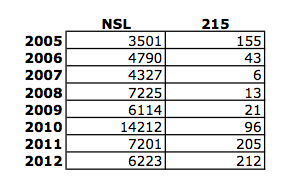The Reason Treasury Has Never Complied with Reagan’s EO: Rampant Privacy Violations
For years, I’ve been noting that the Treasury Department, virtually alone among intelligence agencies, does not have procedures to comply with EO 12333’s restrictions on spying on American citizens. Today, BuzzFeed explains why: Treasury’s foreign intelligence wing, OIA, has been engaging in domestic spying. Effectively, they’ve been piggy-backing on FinCen’s access through the Bank Secrecy Act to get information on Americans.
The story describes two big violations. First, when OIA gets masked reports, they call banks to learn the identities of the Americans masked in the reports.
Some sources have also charged that OIA analysts have, in a further legal breach, been calling up financial institutions to make inquiries about individual bank accounts and transactions involving US citizens. Sources said the banks have complied with the requests because they are under the impression they are giving the information to FinCEN, which they are required to do.
One source recalled an instance from 2016 in which OIA personnel, inserting themselves into a domestic money-laundering case, sought information from a Delaware financial institution. In other cases, according to a second source, FinCEN gave OIA reports with the names of US citizens and companies blacked out. OIA obtained those names by calling the banks, then used those names to search the banking database for more information on those American citizens and firms
OIA has also been permitting other agencies — it names CIA and DIA — to put temporary duty officers to access classified banking networks.
Sources also claimed that OIA has opened a back door to officers from other intelligence agencies throughout the government, including the the CIA and the Defense Intelligence Agency. Officials from those agencies have been coming to work at OIA for short periods of time, sometimes for as little as a week, and thereby getting unrestricted access to information on US citizens that they otherwise could not collect without strict oversight.
Dean Boyd has a pretty funny non-denial denial of this charge in the article.
The Defense Intelligence Agency did not respond to a request for comment. CIA spokesman Dean Boyd said, “Suggestions that the Agency may be improperly collecting and retaining US persons data through the mechanisms you described are completely inaccurate.”
I suspect the source of this problem is that Treasury is split into two, with one group doing foreign intelligence and another doing domestic intelligence.
Under a seminal Reagan-era executive order, a line runs through the Treasury Department and all other federal agencies separating law enforcement, which targets domestic crimes, from intelligence agencies, which focus on foreign threats and can surveil US citizens only in limited ways and by following stringent guidelines.
Compare that with FBI, which hasn’t been split in two since the PATRIOT Act, and so can access vast swaths of intelligence on Americans by pretending to be looking at foreigners. I also suspect the reason this hasn’t been changed at Treasury is because it would piss off the banks, making it clear that the mandated spying assistance under the Bank Secrecy Act implicates their customers too.



